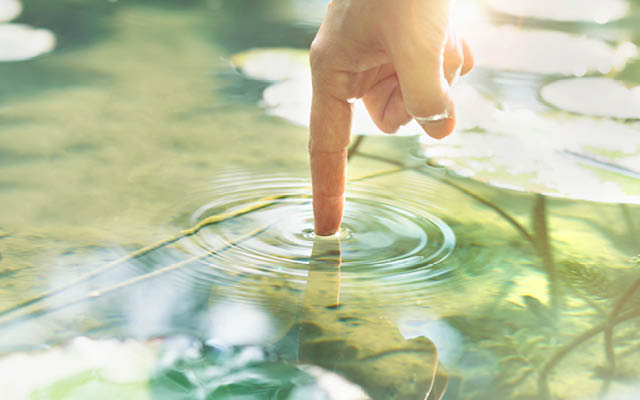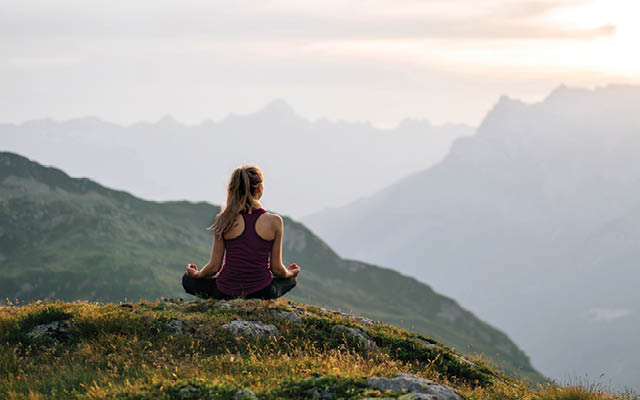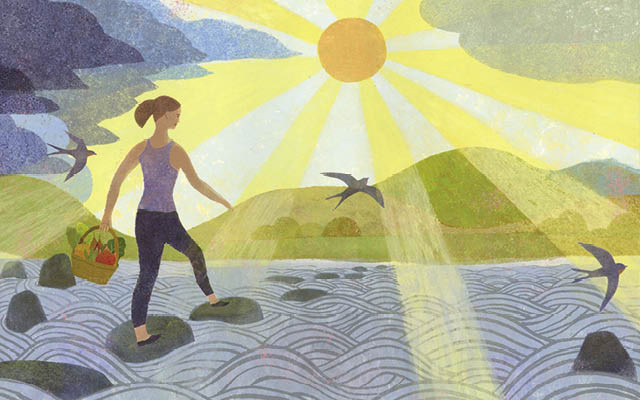1. Breath
Poor breathing techniques block energy, Grauds says. Fearful breathing is often shallow and constricted. As a result, cells experience oxygen deprivation and send out panic signals that feel like discomfort, anxiety, dread, fatigue, or helplessness — contributing to more fear. A chronically low supply of oxygen also weakens the immune system and depresses circulation in the brain. It can also contribute to the onset of cancer and heart disease.
How to Access It: If you’re feeling anxious, take note of your breath. If it’s shallow, take several slow, deep breaths, filling your diaphragm, to nourish the organs, muscles, tissues, and cells with oxygen. Breathe through your nose instead of your mouth to oxygenate the brain.
2. Water
Poor hydration blocks energy, Grauds notes. Chronic dehydration breaks down cell structure, impairs the flow of nutrients, causes free-radical damage and chronic fatigue, and disrupts the flow of hormones, enzymes, and neurotransmitters. It also creates “cell panic,” sending the body into water-emergency mode — siphoning water from eyes and joints and rerouting it to support vital organs.
How to Access It: Regularly replenish the water in your body. Sip about half your body weight in ounces of water daily at separate intervals, even if you aren’t thirsty. Waiting until you’re thirsty to drink means you’re already parched. After you drink caffeinated beverages (which dehydrate the body), exercise, or eat a lot of protein, you’ll need additional water.
3. Nature
Disconnecting from the life right outside our door blocks energy. Research has noted that hospital patients who get even a glimpse of nature through a window will heal faster than those who don’t. The energy we derive from our connection to the outdoors is also undermined when our environment is polluted or otherwise degraded, leading to toxic stress and illness.
How to Access It: Spend 10 minutes lying in the grass looking at the sky, taking a walk in a park, or visiting a body of water. The act of gardening is really helpful — as is placing a favorite potted plant in your office. Just listening to nature’s sounds can also be rejuvenating. Make a point of vacationing in deeper nature whenever possible.
4. Relationships
Insufficient healthy contact with other human beings blocks energy. Multiple scientific studies have shown that the lack of relationships — a form of disconnection related to the fearful self — contributes to anxiety, depression, stress, cancer, heart disease, and substance abuse.
How to Access It: Spend time with people you enjoy and respect. Instead of accepting relationships brimming with fear-based qualities like possessiveness or insecurity, focus on developing sustainable, supportive connections based in kindness, presence, and love.
5. Altruism
Focusing on only ourselves blocks energy, says Grauds. Giving time and energy to others releases fear and awakens the sustainable self.
How to Access It: Recognize that serving others has a positive biological and psychological effect on you. Experiment with committing random (or more deliberate) acts of kindness at every opportunity.
This originally appeared in “Reclaim Your Energy” in the December 2020 print issue of Experience Life.




This Post Has 0 Comments